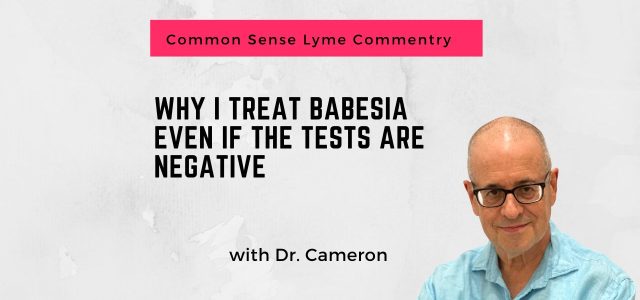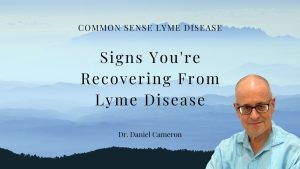
The Question I Hear Most Often
Babesia negative tests are one of the most common reasons patients go untreated. When a patient asks why I treat Babesia even if the tests are negative, they often say:
“But my test was negative—why are we treating Babesia?”
It’s a fair question.
I’ll often explain that Babesia testing isn’t perfect. False negatives are common. And many patients improve when we treat for Babesia—despite negative test results.
So today, let’s break it down—in the form of a clinical dialogue.
A Clinical Dialogue on Babesia Negative Tests
Cameron: One of my patients had classic Babesia symptoms—night sweats, air hunger, severe fatigue—but her test came back negative. She asked, “Are we sure I have Babesia?”
Colleague: That’s a tough spot. The tests—like PCR and blood smear—are known to miss cases, especially if the parasitemia is low.
Cameron: Exactly. And Babesia can persist in tissues, not just the bloodstream. By the time symptoms show up, the parasite may not be detectable.
Colleague: So you’re relying on clinical diagnosis?
Cameron: Yes. I look at the full picture—especially when a patient isn’t improving with Lyme-only treatment. If they have night sweats, POTS, air hunger, or unexplained drops in oxygen levels, Babesia is high on my list.
Colleague: Have you seen patients get better on Babesia treatment even without positive tests?
Cameron: Many times. Some improve dramatically with atovaquone and azithromycin. Others need more aggressive treatment. The point is—symptoms, not just test results, guide treatment.
What the Research Shows About Babesia Negative Tests
Babesia PCR and smear have limited sensitivity—false negatives are common, especially in chronic cases. Studies show Babesia can persist despite negative tests. Babesia duncani may not be picked up by B. microti-focused tests. Immunocompromised patients often test negative despite active infection.
The testing limitations are well-documented in the medical literature. When parasitemia is low or cycling, even well-performed tests may miss infection. This creates a diagnostic gap where clinically ill patients are told they don’t have Babesia based solely on laboratory results.
Why Clinical Judgment Still Matters
Tick-borne diseases often co-occur and mask each other. Tests are snapshots—symptoms are the full story. Babesia negative tests shouldn’t exclude treatment when clinical signs are strong. Empiric treatment can be both diagnostic and therapeutic.
When a patient presents with persistent symptoms despite appropriate Lyme disease treatment, I consider co-infection. The pattern of symptoms—particularly night sweats, air hunger, and autonomic dysfunction—provides diagnostic information that laboratory testing cannot capture.
Response to treatment becomes part of the diagnostic process. When patients improve significantly on Babesia-directed therapy, that clinical response supports the diagnosis even without positive serology.
What I Do in My Practice
I ask about hallmark Babesia symptoms: night sweats, air hunger, fatigue, and autonomic issues. I treat empirically when symptoms are consistent and Lyme-only treatment has failed. I monitor response closely—improvement can confirm the diagnosis. I adjust treatment based on clinical response, not just lab data.
This approach reflects a fundamental reality: treating tick-borne illness requires integrating laboratory data with clinical judgment. When the two conflict, symptoms and response to treatment often provide more reliable diagnostic information than a single negative test result.
Frequently Asked Questions
Can you have Babesia with a negative test?
Yes. Babesia negative tests are common. PCR and blood smears frequently miss low-level or chronic infections. Clinical symptoms often matter more than lab results.
Why does Babesia testing fail?
Babesia parasites cycle in and out of the bloodstream. Tests may miss infection if drawn at the wrong time, if parasitemia is low, or if the wrong species is tested.
Should I be treated for Babesia if my test is negative?
If you have hallmark symptoms—night sweats, air hunger, crushing fatigue, autonomic dysfunction—and haven’t improved with Lyme treatment alone, empiric Babesia treatment may be appropriate.
How do you know treatment is working without a positive test?
Clinical response guides the diagnosis. If symptoms improve with Babesia treatment, that supports the diagnosis—even without a positive test.
What symptoms suggest Babesia despite negative tests?
Drenching night sweats, air hunger, POTS or autonomic instability, crushing fatigue, and failure to improve on Lyme treatment all raise suspicion for Babesia.
Clinical Takeaway
Babesia is often missed—not because it’s rare, but because testing is limited. When patients present with persistent symptoms and babesia negative tests, I don’t dismiss them—I dig deeper. If treatment for Lyme disease alone isn’t working, I ask: What if it’s Babesia? A negative test shouldn’t be the end of the conversation. It should be the start of a closer look. That’s why I treat Babesia when the symptoms fit—even if the test doesn’t. The dialogue format above reflects conversations I have regularly with patients and colleagues. Testing serves as one piece of diagnostic information, but clinical presentation and treatment response often provide more definitive answers. When the clinical picture strongly suggests Babesia co-infection, empiric treatment is medically appropriate—and often reveals the diagnosis that laboratory testing missed.
Related Reading
- Lyme Disease Testing and Diagnosis
- Babesia Testing Errors Can Delay Treatment
- Babesia: What Lyme Patients Need to Know
- Babesia Treatment Protocol: Medications, Dosing & What to Expect
- Babesia Treatment Duration: When 10 Days Isn’t Enough
- Lyme Disease Relapse Babesia: Why Symptoms Return
- Babesia Coinfection Makes Lyme Worse (But Doctors Miss It)
- Understanding Lyme Disease Coinfections
References
- Krause PJ, et al. Atovaquone and azithromycin for the treatment of babesiosis. N Engl J Med. 2000;343(20):1454-1458.
- Centers for Disease Control and Prevention. Clinical Overview of Babesiosis. Accessed 2025.
- Krause PJ, et al. Persistent parasitemia after acute babesiosis. N Engl J Med. 1998;339(3):160-165.
- Homer MJ, et al. Babesiosis. Clin Microbiol Rev. 2000;13(3):451-469.



I recently have read reports of the babesia strain Odocoilei being far more common that once supposed. I have also been reading recently that this strain might be a “missing link” in patients with refractory TBDs, who when treated for this strain, have shown improvements. Questions: does this strain cause the same symptoms as other babesia strains? And, might it be wise to assume this strain is a culprit, despite lack of symptoms and despite positive testing. To my understanding it is T-Labs that is picking this up. Thank sincerely for for all you do. Mary
You raised questions that have yet to be resolved. We are all waiting for information.
Have you seen psychological changes such as loss of self control and aggression in kids with tick-borne illness? Specifically in response to eating salicylates and oxalates and even when smelling beef tallow smoking/cooking? Also increased ocd symptoms after physical activity and recently after eating beef. We have also had mold exposure.
I have a wide range of psychiatric presentation some of which meets the PANS criteria. I also have seen Lyme rage.
Can immune systems cure Babesiosis. I believe I’ve had TBD (Lyme) for 70 years, but among innumerable symptoms, I had some attributable to babesiosis that came and went. eg drenching night sweats that continued nightly for about 3 weeks then never returned. Also, air hunger that meant I could not sleep in bed for about 5 weeks, then all was OK again.
Should I worry if it was babesiosis? My long delayed treatment for Lyme was not successful.
The immune system does not appear to be very successful at clearing untreated tick borne infection. Some get better with their first treatment. Some of my patients benefit from retreatment. I have had patient who were not treated long enough for Babesia with Zithromax and Malarone.
My daughter had PANS when 7 and found to have mycoplasma along with tick co-infections. She was treated for 6 months and ALL resolved (anorexia, anxiety, ocd, motor tics). At 13 symptoms surged again and she was treated again (bc of pos co-infections on galaxy and irenics and re-occurring strep and other illnesses – for 3 months). She has been healthy and happy until two years ago at 19 when she suddenly fell very ill after mono/enlarged spleen – two years out she has chronic ibs-c, fatigue, air hunger, POTS, sweating, strange aches and pains and rashes intermittently etc. She is newly positive for lyme, bartonella and babesia. She also has anaphylactic food allergies since birth (nuts). We have treated for 6 months again. But babesia symptoms linger and she is still pos (other two are negative now). Doctor put her on Minocycline, atavequone AND Arakoda for 2 more months. I’m worried it will do more harm than good now. Worried about long term effects. Should we go off meds and just let her body try to fight? Do no more harm? When do we stop meds and move to healing her gut? Meds are causing symptoms too. Need another opinion (from a vector illness literate doc without seeing a million more doctors). Is this excessive? Or the only way to get rid of it permanently? We trust our amazing doctor but are starting to worry about the amount of medication.
My wester blot shows 2 positive iGg and my doctor says I don’t have Lyme. They said, something could produce this “false negative.” I’ve read the opposite, that less than 5 positives is an indication of an old infection. Which is true and do I need to be treated? I also suspect other co-infections based on my symptoms. Thanks!
Two bands can be from healthy bacteria in the body. I have Lyme patients who never get a positive test. I have had to use clinical judgement
Thank you for your reply. It is appreciated! 😊
Do you use Igenex tests to confirm?